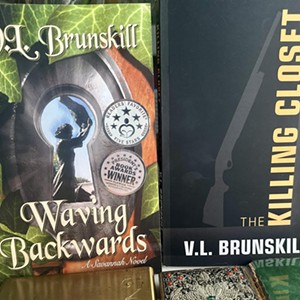Book Reviews
[
{
"name": "Air - MedRect Combo - Inline Content 1",
"component": "14680855",
"insertPoint": "7",
"requiredCountToDisplay": "5",
"parentWrapperClass": "fdn-ads-inline-content-block"
},{
"name": "Air - MedRect Combo - Inline Content 2",
"component": "14680856",
"insertPoint": "15",
"requiredCountToDisplay": "9",
"parentWrapperClass": "fdn-ads-inline-content-block"
},{
"name": "Air - SVP - Leaderboard - Inline Content - 2",
"component": "16852291",
"insertPoint": "10",
"requiredCountToDisplay": "10",
"parentWrapperClass": "fdn-ads-inline-content-block"
},{
"name": "Air - SVP - Leaderboard - Inline Content - 3",
"component": "16852292",
"insertPoint": "20",
"requiredCountToDisplay": "18",
"parentWrapperClass": "fdn-ads-inline-content-block"
},{
"name": "Air - SVP - Leaderboard - Inline Content - 1",
"component": "16852290",
"insertPoint": "25",
"requiredCountToDisplay": "22",
"parentWrapperClass": "fdn-ads-inline-content-block"
}
]
Portrait of Johnny: The Life of John Herndon Mercer
by Gene Lees
(Pantheon)
Written by lauded jazz critic and Mercer family friend Gene Lees, this worthwhile biography of the great Savannahian suffers a bit from being too close to its subject matter.
Sometimes only an outsider can paint an adequate portrait of an artist, and that seems to be the case with Leess curiously anemic story of that charismatic musical giant, Johnny Mercer, a visionary so ahead of his time that he is is still considered the greatest lyricist the United States has ever produced.
That being said, Portrait of Johnny has great historical value and does offer a lot of insight not only into the minutiae of Mercers life, but the continuing and constant influence of his Savannah roots throughout his life.
Unlike many local-born celebs, Mercer never made an attempt to distance himself from Savannah, a city he clearly loved and cherished like no other -- not even Manhattan, where his career first blossomed, and with which Mercer had that interesting love-hate relationship typical of many Southerners with the Big Apple.
All in all, a flawed book, but one no self-respecting Mercer fan or Savannah cultural history buff will want to be without.
A Sail and Tale of an Emotional Rescue
by Samuel Phillis
(Xlibris)
Every now and then at Connect we come across a book so unique, so individualistic, so off-the-hook that it just makes us smile. Sam Philliss A Sail and Tale is such a book.
A glorious hodge-podge of an account of his voyages off the Eastern Seaboard -- including a recent and near-lethal brush with Tropical Storm Kyle off the Savannah coast -- Philliss book is a hectic, deeply personal memoir of one mans life struggle, depicted by his efforts to tame the sea almost single-handed in a thirty-foot sailing vessel.
Successful businessman, cancer survivor and self-professed bipolar disorder sufferer, Phillis decided to sell his house and his business and do what he really loves: sail.
With a funny, engaging writing style and a great eye for photo composition (all taken on CVS disposables, he says, because his Nikon was stolen), A Sail and Tale takes you on what is sometimes literally a whirlwind tour of the Intracoastal Waterway and points offshore.
The book is much like the author himself: warm, engaging, and somewhat chaotic (there is not just one, but three separate endings). Its a book that, despite its many minor flaws, will no doubt remind you of your own personal voyages, large and small.
Most of all, in a publishing world full of self-important, literary tomes of questionable human value, Philliss sailing memoir is quite simply a breath of fresh air in your own sail.
Phillis, docked in Savannah for the time being, will host several local book-signings:
Friday, Nov. 19, at 5 p.m. at the Atlantic Beacon Gallery, 1606 Butler Ave. on Tybee Island;
Friday, Nov. 26, 1-5 p.m. at the Hallmark Store in the Village on Skidaway;
Friday, Nov. 26, 6-8 p.m. at the Westin Savannah Harbor Resort;
and Sunday, Dec. 5, 2-6 p.m. at the Crab Shack on Tybee.
The Ptolemies
By Duncan Sprott
(Knopf)
Not looking forward to a novel set in Greek-dominated Egypt soon after the death of Alexander the Great, you say? Youll be pleasantly surprised by this tour de force, a vast yet very human narrative of the Ptolemies, the great -- and greatly flawed -- Greek family that ruled Egypt before the rise of Rome and the coming of Cleopatra.
Dryly humorous, with a true cynics eye for the hilarity of human frailty, Sprotts fanciful account manages to keep you gripped to each page as well as steeping you in the times.
Less about the sweeping of history than the little things that make cultures different, The Ptolemies is an engaging read in that sometimes-leastengaging of genres, the historical novel.
A lesser author would attempt to recreate the speaking style of the time, but Sprott is content to let the characters speak in very accessible modern English -- no slang, thankfully -- allowing the context of their conversations, rich in supersition, mythology, and soothsaying, to convey the history.
The Kennedy Assassination Tapes: The White House Conversations of Lyndon B. Johnson Regarding the Assassination, the Warren Commission and the Aftermath
by Max Holland
(Knopf)
As a longtime JFK assassination buff, I was stoked when Connect got this review copy in the mail. But while this book is indeed an absolute treasure trove of official communication from the period, those looking for a new conspiracy angle will be disappointed.
Holland explicitly states in his foreword that the focus here is on only one of the decisions facing President Johnson during his first days in office, namely, how to mount an investigation of the assassination that would both satisfy responsible opinion and keep the matter from being exploited for political or personal gain. Holland lives up to this promise in his exhaustive research, based primarily on files from the White House Communications Office and the LBJ presidential library.
He purposely spends a large amount of space documenting the rift between the newly-sworn in johnson and Robert F. Kennedy, still serving as attorney general. RFK seems almost in denial about the fact that his brother is no longer president; his palpable disrespect for the new president, while understandable in a time of mourning, cannot help but elicit sympathy for the beleaguered Johnson, anxious not to appear too eager to step into JFKs shoes.
Despite numerous recorded conversations of Johnson bitching to friends and advisers about the power of the growing JFK mythos, one does marvel at LBJs extraordinary patience. It is a testament not only to Johnsons fabled political prowess, but to his love for his country, that he is able to realize that while JFKs martyrdom will keep him forever playing second banana, it may be in Americas best interest as well as his own to allow it to work its magic -- a magic that continues to this day.
Persepolis 2
by Marjane Satrapi
(Pantheon)
The followup to her fantastic Persepolis, this bitingly funny -- and sometimes heartbreaking -- graphic novel continues this autobiographical story of an intelligent, driven yong Iranian woman raised by welleducated parents, and her struggle to cope with the monolothic and deeply misogynous strain of Islamic fundamentalism overtaking her country.
The first graphic novel ended with Marjane leaving Iran for Europe as a teenager following the devastating social changes of the Iranian revolution in the early 80s. Persepolis 2 begins exactly where the first novel left off, and goes on to chronicle her lonely four years in Austria and her eventual return to Iran.
Once back in her native land, Marjane discovers that the new Iranian state has no room for women of education and striving -- indeed no room for a woman with an opinion about anything at all. Refusing to be oppressed, yet refusing to completely turn her back on her homeland, Persepolis 2 is Marjanes way of coping with the existential dilemma she finds hersefl in.
Satrapis crisp black and white drawings are -- I think quite deliberately -- cartoonish in style. Illustration majors should not pick this book up expecting art tips. Satrapi is first and foremost a storyteller not an illustrator, and the amateurish quality of her drawing only serves to highlight the deep seriousness of the story she tells.
Monumental Propaganda
by Vladimir Voinovich
translated by Andrew Bromfield
(Knopf)
Satire is a dying art stateside, but it seems to come easily for the acclaimed Russian novelist Vladimir Voinovich.
This delightfully deadpan telling of the story of dedicated Stalinist Aglaya Stepanova Revkina
contains in its sweep not only much humor, but a wicked portrayal of the deep corruption of the Soviet Communist Party and the cascading effect its iron-handed indoctrination had on every level of Russian life.
The story centers on Revkinas successful campaign to have her local Party committee build a butt-ugly iron statue of Stalin, only to see her cherished dictatorial hero fall from favor as various incarnations of the Soviet government alternately bury Stalins legacy and expose it again as political currents
and trends dictate.
Still, a foreign novel is only as
good as its translation, and I suspect translator Andrew Bromfield deserves a chunk of credit for transcribing Voinovichs endless supply of Russian puns into suitable English wordplay.
by Gene Lees
(Pantheon)
Written by lauded jazz critic and Mercer family friend Gene Lees, this worthwhile biography of the great Savannahian suffers a bit from being too close to its subject matter.
Sometimes only an outsider can paint an adequate portrait of an artist, and that seems to be the case with Leess curiously anemic story of that charismatic musical giant, Johnny Mercer, a visionary so ahead of his time that he is is still considered the greatest lyricist the United States has ever produced.
That being said, Portrait of Johnny has great historical value and does offer a lot of insight not only into the minutiae of Mercers life, but the continuing and constant influence of his Savannah roots throughout his life.
Unlike many local-born celebs, Mercer never made an attempt to distance himself from Savannah, a city he clearly loved and cherished like no other -- not even Manhattan, where his career first blossomed, and with which Mercer had that interesting love-hate relationship typical of many Southerners with the Big Apple.
All in all, a flawed book, but one no self-respecting Mercer fan or Savannah cultural history buff will want to be without.
A Sail and Tale of an Emotional Rescue
by Samuel Phillis
(Xlibris)
Every now and then at Connect we come across a book so unique, so individualistic, so off-the-hook that it just makes us smile. Sam Philliss A Sail and Tale is such a book.
A glorious hodge-podge of an account of his voyages off the Eastern Seaboard -- including a recent and near-lethal brush with Tropical Storm Kyle off the Savannah coast -- Philliss book is a hectic, deeply personal memoir of one mans life struggle, depicted by his efforts to tame the sea almost single-handed in a thirty-foot sailing vessel.
Successful businessman, cancer survivor and self-professed bipolar disorder sufferer, Phillis decided to sell his house and his business and do what he really loves: sail.
With a funny, engaging writing style and a great eye for photo composition (all taken on CVS disposables, he says, because his Nikon was stolen), A Sail and Tale takes you on what is sometimes literally a whirlwind tour of the Intracoastal Waterway and points offshore.
The book is much like the author himself: warm, engaging, and somewhat chaotic (there is not just one, but three separate endings). Its a book that, despite its many minor flaws, will no doubt remind you of your own personal voyages, large and small.
Most of all, in a publishing world full of self-important, literary tomes of questionable human value, Philliss sailing memoir is quite simply a breath of fresh air in your own sail.
Phillis, docked in Savannah for the time being, will host several local book-signings:
Friday, Nov. 19, at 5 p.m. at the Atlantic Beacon Gallery, 1606 Butler Ave. on Tybee Island;
Friday, Nov. 26, 1-5 p.m. at the Hallmark Store in the Village on Skidaway;
Friday, Nov. 26, 6-8 p.m. at the Westin Savannah Harbor Resort;
and Sunday, Dec. 5, 2-6 p.m. at the Crab Shack on Tybee.
The Ptolemies
By Duncan Sprott
(Knopf)
Not looking forward to a novel set in Greek-dominated Egypt soon after the death of Alexander the Great, you say? Youll be pleasantly surprised by this tour de force, a vast yet very human narrative of the Ptolemies, the great -- and greatly flawed -- Greek family that ruled Egypt before the rise of Rome and the coming of Cleopatra.
Dryly humorous, with a true cynics eye for the hilarity of human frailty, Sprotts fanciful account manages to keep you gripped to each page as well as steeping you in the times.
Less about the sweeping of history than the little things that make cultures different, The Ptolemies is an engaging read in that sometimes-leastengaging of genres, the historical novel.
A lesser author would attempt to recreate the speaking style of the time, but Sprott is content to let the characters speak in very accessible modern English -- no slang, thankfully -- allowing the context of their conversations, rich in supersition, mythology, and soothsaying, to convey the history.
The Kennedy Assassination Tapes: The White House Conversations of Lyndon B. Johnson Regarding the Assassination, the Warren Commission and the Aftermath
by Max Holland
(Knopf)
As a longtime JFK assassination buff, I was stoked when Connect got this review copy in the mail. But while this book is indeed an absolute treasure trove of official communication from the period, those looking for a new conspiracy angle will be disappointed.
Holland explicitly states in his foreword that the focus here is on only one of the decisions facing President Johnson during his first days in office, namely, how to mount an investigation of the assassination that would both satisfy responsible opinion and keep the matter from being exploited for political or personal gain. Holland lives up to this promise in his exhaustive research, based primarily on files from the White House Communications Office and the LBJ presidential library.
He purposely spends a large amount of space documenting the rift between the newly-sworn in johnson and Robert F. Kennedy, still serving as attorney general. RFK seems almost in denial about the fact that his brother is no longer president; his palpable disrespect for the new president, while understandable in a time of mourning, cannot help but elicit sympathy for the beleaguered Johnson, anxious not to appear too eager to step into JFKs shoes.
Despite numerous recorded conversations of Johnson bitching to friends and advisers about the power of the growing JFK mythos, one does marvel at LBJs extraordinary patience. It is a testament not only to Johnsons fabled political prowess, but to his love for his country, that he is able to realize that while JFKs martyrdom will keep him forever playing second banana, it may be in Americas best interest as well as his own to allow it to work its magic -- a magic that continues to this day.
Persepolis 2
by Marjane Satrapi
(Pantheon)
The followup to her fantastic Persepolis, this bitingly funny -- and sometimes heartbreaking -- graphic novel continues this autobiographical story of an intelligent, driven yong Iranian woman raised by welleducated parents, and her struggle to cope with the monolothic and deeply misogynous strain of Islamic fundamentalism overtaking her country.
The first graphic novel ended with Marjane leaving Iran for Europe as a teenager following the devastating social changes of the Iranian revolution in the early 80s. Persepolis 2 begins exactly where the first novel left off, and goes on to chronicle her lonely four years in Austria and her eventual return to Iran.
Once back in her native land, Marjane discovers that the new Iranian state has no room for women of education and striving -- indeed no room for a woman with an opinion about anything at all. Refusing to be oppressed, yet refusing to completely turn her back on her homeland, Persepolis 2 is Marjanes way of coping with the existential dilemma she finds hersefl in.
Satrapis crisp black and white drawings are -- I think quite deliberately -- cartoonish in style. Illustration majors should not pick this book up expecting art tips. Satrapi is first and foremost a storyteller not an illustrator, and the amateurish quality of her drawing only serves to highlight the deep seriousness of the story she tells.
Monumental Propaganda
by Vladimir Voinovich
translated by Andrew Bromfield
(Knopf)
Satire is a dying art stateside, but it seems to come easily for the acclaimed Russian novelist Vladimir Voinovich.
This delightfully deadpan telling of the story of dedicated Stalinist Aglaya Stepanova Revkina
contains in its sweep not only much humor, but a wicked portrayal of the deep corruption of the Soviet Communist Party and the cascading effect its iron-handed indoctrination had on every level of Russian life.
The story centers on Revkinas successful campaign to have her local Party committee build a butt-ugly iron statue of Stalin, only to see her cherished dictatorial hero fall from favor as various incarnations of the Soviet government alternately bury Stalins legacy and expose it again as political currents
and trends dictate.
Still, a foreign novel is only as
good as its translation, and I suspect translator Andrew Bromfield deserves a chunk of credit for transcribing Voinovichs endless supply of Russian puns into suitable English wordplay.



























